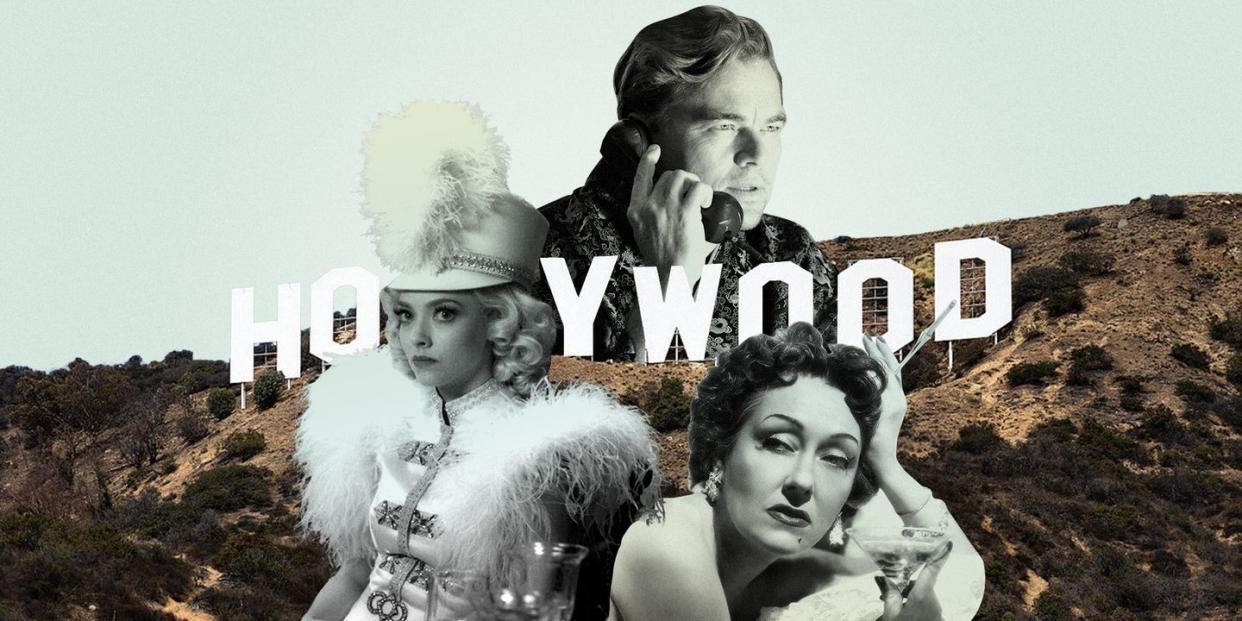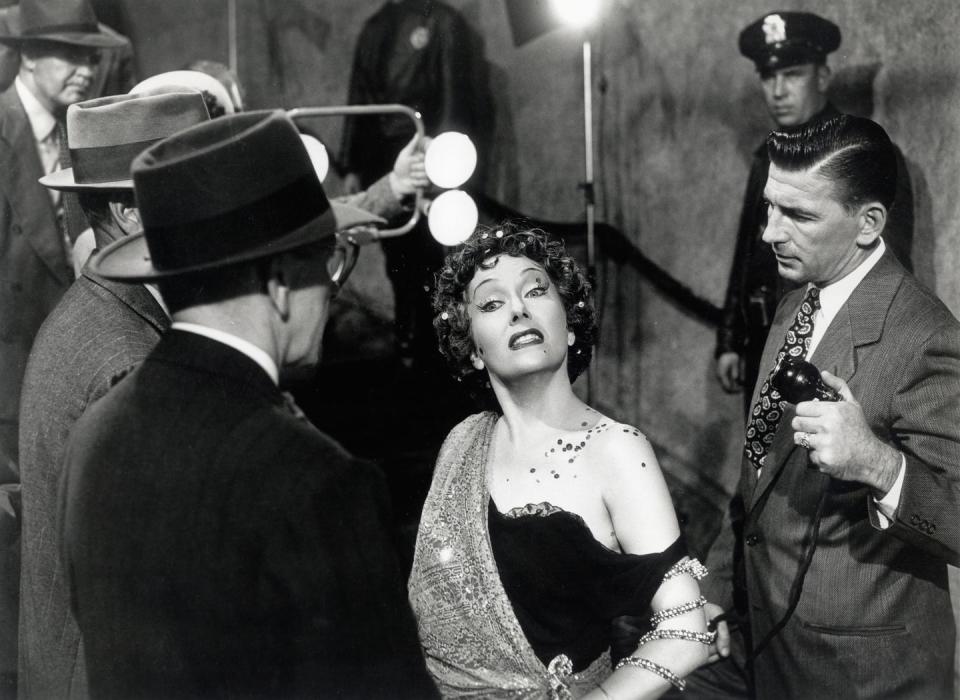Will Hollywood Ever Stop Shaking Its Own Hand? We’ll See, After the Oscars.

Hollywood’s narcissism knows no bounds. I know, I know, that’s hardly the most controversial or contrarian take, but it doesn’t make it any less true. And rarely is that inflated self-regard more on parade than during Oscar season every year. In fact, it sometimes feels as if everyone who gets their Restoration Hardware catalogues delivered between the zip codes of Santa Monica and Silver Lake loves nothing more than looking in the mirror and seeing their own reflections staring back at them.
That heliocentric sense of vanity dates all the way back to the birth of cinema. But it took root in earnest in the 1950s, when Billy Wilder’s twisted take on Tinseltown, Sunset Boulevard, was nominated for 11 statuettes. Tellingly, it was only one-upped by Joseph L. Mankiewicz’s backstage feud-fest All About Eve (yes, that film is technically set in the world of the theater, but it’s still a brilliantly acidic expose on the tribal rites and insecurities of actors). Eve would sweep the awards in 1951, earning a record 14 nods and winning in six categories including Best Picture. The self-congratulatory back-patting didn’t stop there. Actually, it was just getting started. With foreign-language films such as Francois Truffaut’s 1973 inside-baseball classic Day For Night, the swooning celluloid romance of 1988’s Cinema Paradiso, and the 2011 Best Picture-winning mash note to the era of silent films The Artist, American filmmakers don’t have a monopoly on the theme. But we certainly are, hands down, the industry leader thanks to recent homegrown Oscar nominees like 2004’s The Aviator, 2011’s Hugo, and 2019’s Once Upon a Time...in Hollywood.
Pandemic or no pandemic, the current season has proven to be no exception. On the eve of this year’s Academy Awards (airing this Sunday), the most-nominated film going into the annual cavalcade of egos and self-importance is—surprise, surprise—David Fincher’s Mank. Written by Fincher’s late father, Mank is the story of legendary screenwriter (and legendary drunk) Herman J. Mankiewicz (yes, Joseph’s brother), the troubled-but-brilliant screenwriter of Orson Welles’ 1941 masterpiece Citizen Kane. Mank is a poison-pen love letter to Hollywood’s Golden Age—an era when the town was populated by outsize personalities (both above and below the line). Through its boozy, smoky haze, it glamorizes the unsung wordsmiths sitting behind their beat-up Underwoods churning out scenarios for which they would never receive proper credit. In other words, it’s exactly the kind of movie your average Oscar voter responds to like a tabby getting its first taste of catnip. Will it win Best Picture? Who the hell knows. Is it the best film in the race? Nope. But it already has one built-in advantage: it’s the film that the industry’s balloting class can certainly relate to the most—because it’s about their favorite subject: themselves.

In case you needed further proof that movie folks are hopeless suckers for stories about their own day jobs, then consider this: Mank isn’t even the first film to chronicle cinema’s great genius, Orson Welles (someone, for the record, they didn’t give two shits about while he still had a pulse). Hell, it’s not even the first film about the making of Citizen Kane (see 1999’s RKO 281). Welles may have been a hubristic pariah amongst the Hollywood community when he first arrived there as brash 25-year-old theater-and-radio wunderkind in 1940, but a half a century after his exile and eventual fall from the heights of cinema’s Mount Olympus, he’s now an A-list star thanks to Mank.
Even beyond the glitzy gladiatorial arena of the Oscars, history has proven that the men and women who draw their paychecks by toiling inside of the Dream Factory are spellbound by their own gaze. And it’s a trend that’s only gathered momentum since the ‘90s regardless of genre. There have been in-the-know comedies such as Bowfinger and Tropic Thunder, existential satires like Adaptationand Ed Wood, artsy funhouse mirrors such as Living in Oblivion and Shadow of the Vampire and straight-down-the-middle populist crowd-pleasers like Get Shorty and Saving Mr. Banks. There have even been self-reflexive horror films such as Scream and Wes Craven’s New Nightmare. And that’s not even getting into the collective works of the Coen brothers and Quentin Tarantino.

What these films all have in common is that they’re all to some extent pictures that engage with Hollywood from the inside. But, more than that, they flatter the people who develop, greenlight, and bankroll them for a living. After all, even self-mockery can be a form of flattery. Even when these films dare to bite the hand that feeds them (Robert Altman’s The Player, for example), they’re still couched in winking admiration. See how wonderful this crazy business is? There’s really no other way to look at a classic like Sullivan’s Travels or Singin’ in the Rain.
The big question is: Does anyone who doesn’t work inside of Hollywood really care? And if they do, is there any chance that they care half as much as the men and women who work on the studio lots do? I suspect that they don’t. Yes, to some degree American moviegoers care deeply about what happens in La La Land. If they didn’t then the daily Dunkin’ Donuts-fueled comings and goings of Ben Affleck and Ana de Armas wouldn’t have become couch-surfing memes during lockdown. But I wonder if Oscar voters are self-aware enough to realize that most non-industry schlubs (you know, the twenty or thirty million other people who don’t work in showbiz but still tune into the Oscars every year) have no real stake or rooting interest in the rehabilitation of Herman J. Mankiewicz. What does Mank mean to them?
Deep down, I think that now (as ever) Hollywood folks just want to be acknowledged and appreciated. Like the rest of us in the nine-to-five world, regardless of whether you drive an Uber or load packages at Amazon or sell office supplies or perform open-heart surgery, they want to believe that what they do matters. That is why the Oscars were created in the first place. It’s the industry’s version of an off-site where they can hand Rogers or Johnson a set of mid-range steak knives for leading the latest quarter’s in sales. As Sally Field so perfectly put it from the stage at the Oscars, these are people who despite all of their perks, privileges, and personal stylists just want to be liked, really liked…even if they’re the ones who have to do the appreciating.

Get 87 Years of Award-Winning Journalism, Every Day
Join Esquire Select
You Might Also Like